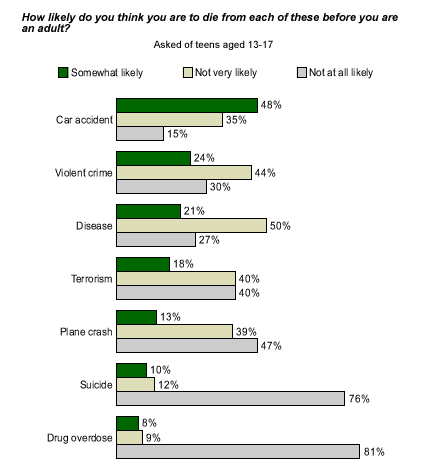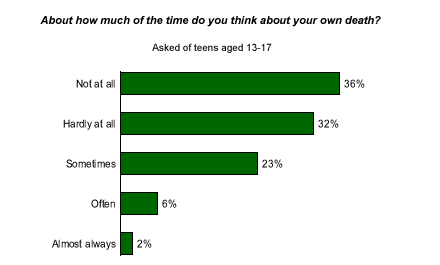The causes and nature of teen alienation are sources of ongoing concern for psychologists, educators -- and, indeed, all parents. It's such a critical issue that the Gallup Youth Survey regularly includes questions designed to gauge teens' feelings of alienation to track it over time. In connection with that effort, the August 2003 youth poll* asked an Internet panel of teens (aged 13 to 17) a battery of questions about possible causes of their own death. Included were items over which they would have no control -- such as an auto accident -- as well as items in which they would take an active part, such as suicide or a drug overdose.
Teens' greatest fears of an early death are by motor vehicle accident, which is the leading cause of teen death according to 2000 data from the National Center for Health Statistics (NCHS). Forty-eight percent of teens said they are "somewhat likely" to die from a car accident before they reach adulthood. Teens express considerably less fear about other possible causes of early death, including from violent crimes (24% say somewhat likely), disease (21%), terrorist act (18%), plane crash (13%), suicide (10%), and drug overdose (8%).

The fact that teens express considerably less fear about dying early from causes they have control over is heartening. Although it may still seem rather alarming that 10% of teens say they are somewhat likely to die by suicide. Suicide is the second-leading cause of death among teenagers aged 13 to 17. Similarly, only 8% have at least a moderate level of fear about dying from a drug overdose.
With regard to both the suicide and drug overdose questions, there is probably an element of social desirability in teens' responses -- that is, some may be unwilling to confess that they would consider suicide or drug use.
Many fewer teens said that they are likely to die from a drug overdose than a plane crash or terrorism, when NCHS statistics indicate that in reality quite the reverse is true. A December 2001 American Psychological Society Observer article about irrational fears, by David Myers of Hope College, explains why teens may be unrealistic about the dangers of drugs. "We fear what's immediate," the article says. "Teens are indifferent to smoking's toxicity because they live more for the present than the distant future." The same logic could apply to drug use.
But responses to the other items suggest teens' perceptions are somewhat out of proportion to their actual likelihood. Teen concerns about plane crashes and terrorism, for example, seem to considerably surpass the actual risks these threats pose. Myers' article can explain this phenomenon, as well. "We fear what's most readily available in memory . . . Horrific images of a DC-10 catapulting across the Sioux City runway, or the Concorde exploding in Paris, or of United Flight 175 slicing into the World Trade Center, form indelible memories. And availability in memory provides our intuitive rule-of-thumb for judging risks."
Fortunately, it does not appear that the majority of teens are consumed with thoughts of dying. When Gallup asked teens how often they think about their own deaths, 32% said "not at all," and another 36% said "hardly at all."

Bottom Line
Although teens' fears about early death are somewhat out of sync with the actual likelihood of dying in different ways, few teens spend even a little bit of time worrying about death. Typical of teen attitudes about death is Marne, a 17-year-old from Wisconsin. Marne says she rarely thinks about her death. "I want to really live and love each day, " she says. "When I'm not capable of testing my limitations anymore, I won't want to be here. But for now, I don't want to meet death for a long, long time."
*The Gallup Youth Survey is conducted via an Internet methodology provided by Knowledge Networks, using an online research panel that is designed to be representative of the entire U.S. population. The current questionnaire was completed by 517 respondents, aged 13 to 17, between Aug. 1 and Aug. 29, 2003. For results based on the total sample, one can say with 95% confidence that the maximum margin of sampling error is ±5 percentage points.